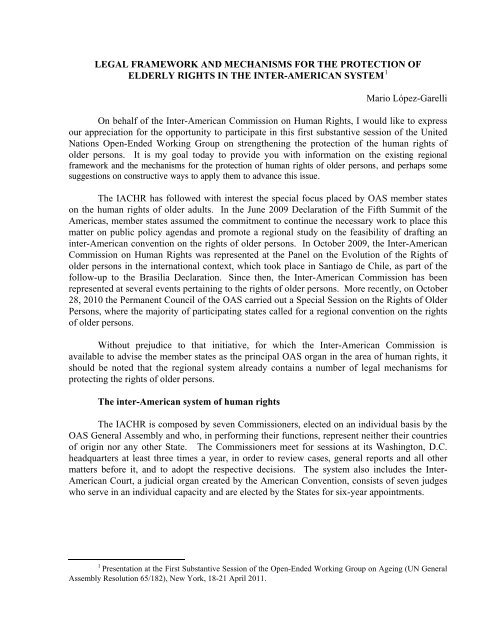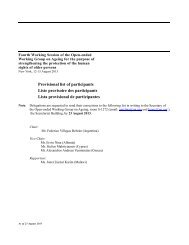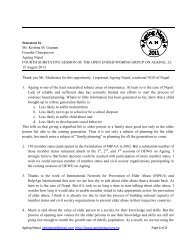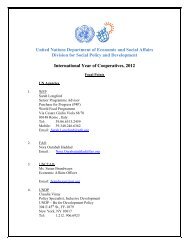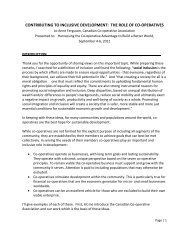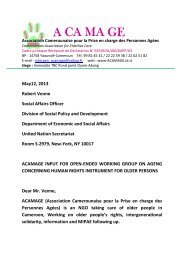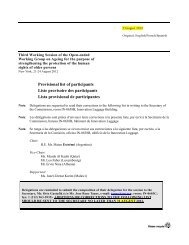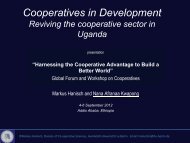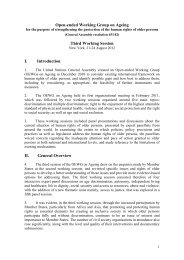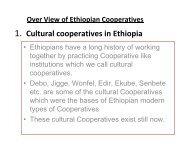Mr. Mario Lopez, Inter-American Commission on Human Rights
Mr. Mario Lopez, Inter-American Commission on Human Rights
Mr. Mario Lopez, Inter-American Commission on Human Rights
You also want an ePaper? Increase the reach of your titles
YUMPU automatically turns print PDFs into web optimized ePapers that Google loves.
LEGAL FRAMEWORK AND MECHANISMS FOR THE PROTECTION OF<br />
ELDERLY RIGHTS IN THE INTER-AMERICAN SYSTEM 1<br />
<str<strong>on</strong>g>Mario</str<strong>on</strong>g> López-Garelli<br />
On behalf of the <str<strong>on</strong>g>Inter</str<strong>on</strong>g>-<str<strong>on</strong>g>American</str<strong>on</strong>g> <str<strong>on</strong>g>Commissi<strong>on</strong></str<strong>on</strong>g> <strong>on</strong> <strong>Human</strong> <strong>Rights</strong>, I would like to express<br />
our appreciati<strong>on</strong> for the opportunity to participate in this first substantive sessi<strong>on</strong> of the United<br />
Nati<strong>on</strong>s Open-Ended Working Group <strong>on</strong> strengthening the protecti<strong>on</strong> of the human rights of<br />
older pers<strong>on</strong>s. It is my goal today to provide you with informati<strong>on</strong> <strong>on</strong> the existing regi<strong>on</strong>al<br />
framework and the mechanisms for the protecti<strong>on</strong> of human rights of older pers<strong>on</strong>s, and perhaps some<br />
suggesti<strong>on</strong>s <strong>on</strong> c<strong>on</strong>structive ways to apply them to advance this issue.<br />
The IACHR has followed with interest the special focus placed by OAS member states<br />
<strong>on</strong> the human rights of older adults. In the June 2009 Declarati<strong>on</strong> of the Fifth Summit of the<br />
Americas, member states assumed the commitment to c<strong>on</strong>tinue the necessary work to place this<br />
matter <strong>on</strong> public policy agendas and promote a regi<strong>on</strong>al study <strong>on</strong> the feasibility of drafting an<br />
inter-<str<strong>on</strong>g>American</str<strong>on</strong>g> c<strong>on</strong>venti<strong>on</strong> <strong>on</strong> the rights of older pers<strong>on</strong>s. In October 2009, the <str<strong>on</strong>g>Inter</str<strong>on</strong>g>-<str<strong>on</strong>g>American</str<strong>on</strong>g><br />
<str<strong>on</strong>g>Commissi<strong>on</strong></str<strong>on</strong>g> <strong>on</strong> <strong>Human</strong> <strong>Rights</strong> was represented at the Panel <strong>on</strong> the Evoluti<strong>on</strong> of the <strong>Rights</strong> of<br />
older pers<strong>on</strong>s in the internati<strong>on</strong>al c<strong>on</strong>text, which took place in Santiago de Chile, as part of the<br />
follow-up to the Brasilia Declarati<strong>on</strong>. Since then, the <str<strong>on</strong>g>Inter</str<strong>on</strong>g>-<str<strong>on</strong>g>American</str<strong>on</strong>g> <str<strong>on</strong>g>Commissi<strong>on</strong></str<strong>on</strong>g> has been<br />
represented at several events pertaining to the rights of older pers<strong>on</strong>s. More recently, <strong>on</strong> October<br />
28, 2010 the Permanent Council of the OAS carried out a Special Sessi<strong>on</strong> <strong>on</strong> the <strong>Rights</strong> of Older<br />
Pers<strong>on</strong>s, where the majority of participating states called for a regi<strong>on</strong>al c<strong>on</strong>venti<strong>on</strong> <strong>on</strong> the rights<br />
of older pers<strong>on</strong>s.<br />
Without prejudice to that initiative, for which the <str<strong>on</strong>g>Inter</str<strong>on</strong>g>-<str<strong>on</strong>g>American</str<strong>on</strong>g> <str<strong>on</strong>g>Commissi<strong>on</strong></str<strong>on</strong>g> is<br />
available to advise the member states as the principal OAS organ in the area of human rights, it<br />
should be noted that the regi<strong>on</strong>al system already c<strong>on</strong>tains a number of legal mechanisms for<br />
protecting the rights of older pers<strong>on</strong>s.<br />
The inter-<str<strong>on</strong>g>American</str<strong>on</strong>g> system of human rights<br />
The IACHR is composed by seven <str<strong>on</strong>g>Commissi<strong>on</strong></str<strong>on</strong>g>ers, elected <strong>on</strong> an individual basis by the<br />
OAS General Assembly and who, in performing their functi<strong>on</strong>s, represent neither their countries<br />
of origin nor any other State. The <str<strong>on</strong>g>Commissi<strong>on</strong></str<strong>on</strong>g>ers meet for sessi<strong>on</strong>s at its Washingt<strong>on</strong>, D.C.<br />
headquarters at least three times a year, in order to review cases, general reports and all other<br />
matters before it, and to adopt the respective decisi<strong>on</strong>s. The system also includes the <str<strong>on</strong>g>Inter</str<strong>on</strong>g>-<br />
<str<strong>on</strong>g>American</str<strong>on</strong>g> Court, a judicial organ created by the <str<strong>on</strong>g>American</str<strong>on</strong>g> C<strong>on</strong>venti<strong>on</strong>, c<strong>on</strong>sists of seven judges<br />
who serve in an individual capacity and are elected by the States for six-year appointments.<br />
1<br />
Presentati<strong>on</strong> at the First Substantive Sessi<strong>on</strong> of the Open-Ended Working Group <strong>on</strong> Ageing (UN General<br />
Assembly Resoluti<strong>on</strong> 65/182), New York, 18-21 April 2011.
2<br />
The <str<strong>on</strong>g>Inter</str<strong>on</strong>g>-<str<strong>on</strong>g>American</str<strong>on</strong>g> <str<strong>on</strong>g>Commissi<strong>on</strong></str<strong>on</strong>g>’s main functi<strong>on</strong> is to promote the observance and<br />
defense of human rights. In fulfilling its mandate, the IACHR performs the following activities:<br />
a. Receives, analyzes, and investigates individual petiti<strong>on</strong>s alleging human<br />
rights violati<strong>on</strong>s.<br />
b. Observes the general level of human rights in the member States and,<br />
when it deems appropriate, publishes special reports <strong>on</strong> the situati<strong>on</strong> in<br />
given States or regarding certain rights or groups of pers<strong>on</strong>s.<br />
c. C<strong>on</strong>ducts <strong>on</strong>-site visits to countries to observe the general situati<strong>on</strong> in<br />
greater depth and issues reports with finding and recommendati<strong>on</strong>s to the<br />
respective member states.<br />
d. Encourages awareness of human rights in the OAS Member States.<br />
e. Organizes and participates in c<strong>on</strong>ferences and meetings with governments,<br />
academics, and n<strong>on</strong>governmental organizati<strong>on</strong>s.<br />
f. Presents recommendati<strong>on</strong>s to OAS member States <strong>on</strong> the adopti<strong>on</strong> of<br />
measures to assist in promoting and guaranteeing human rights.<br />
g. Grants precauti<strong>on</strong>ary measures to prevent serious and irreparable harm to<br />
human rights in urgent cases; it can also request provisi<strong>on</strong>al measures to<br />
the <str<strong>on</strong>g>Inter</str<strong>on</strong>g>-<str<strong>on</strong>g>American</str<strong>on</strong>g> Court.<br />
h. Submits cases to the c<strong>on</strong>tentious jurisdicti<strong>on</strong> of the <str<strong>on</strong>g>Inter</str<strong>on</strong>g>-<str<strong>on</strong>g>American</str<strong>on</strong>g> Court,<br />
and it appears before the Court in those cases.<br />
i. Asks the <str<strong>on</strong>g>Inter</str<strong>on</strong>g>-<str<strong>on</strong>g>American</str<strong>on</strong>g> Court for advisory opini<strong>on</strong>s <strong>on</strong> issues arising<br />
from the interpretati<strong>on</strong> of the <str<strong>on</strong>g>American</str<strong>on</strong>g> C<strong>on</strong>venti<strong>on</strong>.<br />
Individual petiti<strong>on</strong> system<br />
Any pers<strong>on</strong>, group of individuals, or n<strong>on</strong>governmental organizati<strong>on</strong> can place a<br />
complaint before the <str<strong>on</strong>g>Commissi<strong>on</strong></str<strong>on</strong>g>, alleging violati<strong>on</strong>s of the human rights protected by the<br />
<str<strong>on</strong>g>American</str<strong>on</strong>g> C<strong>on</strong>venti<strong>on</strong> and the <str<strong>on</strong>g>American</str<strong>on</strong>g> Declarati<strong>on</strong> of the <strong>Rights</strong> and Duties of Man. Petiti<strong>on</strong>s<br />
may be presented in any of the four official languages of the OAS, by victims themselves or by<br />
third parties. The IACHR studies those petiti<strong>on</strong>s that allege that State agents have committed a<br />
human rights violati<strong>on</strong>. If it finds that the respective State is resp<strong>on</strong>sible, it recommends a<br />
complete investigati<strong>on</strong> and the punishment of all the individuals resp<strong>on</strong>sible, together with full<br />
reparati<strong>on</strong>s to the victims or their families.
3<br />
Until now, very few cases regarding the rights of older pers<strong>on</strong>s that have been brought to<br />
the system and decided by its organs; most of them involve the issues of social security and<br />
retirement. The first of them is known as the Case of the Five Pensi<strong>on</strong>ers v. Peru, in which the<br />
<str<strong>on</strong>g>Inter</str<strong>on</strong>g>-<str<strong>on</strong>g>American</str<strong>on</strong>g> Court found that the State was resp<strong>on</strong>sible for the violati<strong>on</strong> of the victims’ right<br />
to judicial protecti<strong>on</strong> and property, inasmuch as it did not comply with the decisi<strong>on</strong> of the<br />
Supreme Court of that country to restore their pensi<strong>on</strong>s. 2 In another case regarding Peru, the<br />
victims had opted for a pensi<strong>on</strong> plan, but did not receive it for ten years after their retirement,<br />
and were also not protected by the domestic tribunals. The <str<strong>on</strong>g>Inter</str<strong>on</strong>g>-<str<strong>on</strong>g>American</str<strong>on</strong>g> Court determined<br />
that the State had violated their rights to judicial protecti<strong>on</strong> and to property; however, it did not<br />
c<strong>on</strong>sider that there was a violati<strong>on</strong> of Article 26 of the <str<strong>on</strong>g>American</str<strong>on</strong>g> C<strong>on</strong>venti<strong>on</strong>, which pertains to<br />
the progressive development of ec<strong>on</strong>omic, social and cultural rights. 3<br />
Another interesting precedent was set in the Yakye Axa Case, dealing primarily with<br />
indigenous peoples’ rights in Paraguay, which the <str<strong>on</strong>g>Inter</str<strong>on</strong>g>-<str<strong>on</strong>g>American</str<strong>on</strong>g> <str<strong>on</strong>g>Commissi<strong>on</strong></str<strong>on</strong>g> submitted to the<br />
Court after that State failed to comply with its recommendati<strong>on</strong>s. In the judgment of the Court, it<br />
was established that Paraguay had the duty to ensure the aut<strong>on</strong>omy and c<strong>on</strong>tinuing functi<strong>on</strong>ality<br />
of older pers<strong>on</strong>s, by ensuring the enjoyment of their right to adequate food, access to clean water<br />
and health care. 4 The Court determined the duty of the State to provide care for the elderly with<br />
chr<strong>on</strong>ic diseases and those who were in terminal stages, in order to help them avoid unnecessary<br />
suffering.<br />
The IACHR and the Court have determined in various cases the duty of the State to<br />
respect and guarantee the enjoyment of human rights of all pers<strong>on</strong>s subject to its jurisdicti<strong>on</strong>,<br />
with respect to the acti<strong>on</strong>s of authorities but also of third parties. Both organs have also adopted<br />
urgent measures for the protecti<strong>on</strong> of pers<strong>on</strong>s deprived of liberty, specifically regarding their life<br />
and pers<strong>on</strong>al integrity, as well as the minimum c<strong>on</strong>diti<strong>on</strong>s compatible with human dignity,<br />
sanitati<strong>on</strong> and nutriti<strong>on</strong>. In the first case decided with respect to Brazil, the <str<strong>on</strong>g>Inter</str<strong>on</strong>g>-<str<strong>on</strong>g>American</str<strong>on</strong>g><br />
Court held that the State was resp<strong>on</strong>sible for the violati<strong>on</strong> of the rights of Damião Ximenes<br />
Lopes, a patient who was beaten, tortured and eventually died in a psychiatric hospital in that<br />
country in 1999. The Court found that Brazil was resp<strong>on</strong>sible for violating the rights to physical<br />
integrity and to life of the victim, and the rights to access to justice and due process of his<br />
family. Given that the case involved a patient in a l<strong>on</strong>g-term care facility, the standards set by<br />
the Court could be relevant in an eventual case involving the rights of older pers<strong>on</strong>s in a similar<br />
situati<strong>on</strong> of restricted liberty. 5<br />
2 <str<strong>on</strong>g>Inter</str<strong>on</strong>g>-<str<strong>on</strong>g>American</str<strong>on</strong>g> Court of <strong>Human</strong> <strong>Rights</strong>, Case of the Five Pensi<strong>on</strong>ers v. Peru, Judgment of February<br />
28, 2003 (Merits, Reparati<strong>on</strong>s and Costs).<br />
3 I-ACtHR, Case of Acevedo Buendia et al v. Peru, Judgment of July 1, 2009 (Merits, Reparati<strong>on</strong>s and<br />
Costs).<br />
4 I-ACtHR, Case of the Yakye Axa Indigenous Community v. Paraguay, Judgment of June 17,<br />
2005(Merits, Reparati<strong>on</strong>s and Costs).<br />
5 I-ACtHR, Case of Ximenes Lopes v. Brazil, Judgment of 17 August, 2006(Merits, Reparati<strong>on</strong>s and<br />
Costs).
4<br />
Also worthy of menti<strong>on</strong> is the case of Case of Karina M<strong>on</strong>tenegro against Ecuador,<br />
where the allegati<strong>on</strong>s regard the arrest and impris<strong>on</strong>ment of women over 65 years of age, in<br />
violati<strong>on</strong> of that country’s nati<strong>on</strong>al legislati<strong>on</strong>. 6 In its admissibility decisi<strong>on</strong>, the <str<strong>on</strong>g>Inter</str<strong>on</strong>g>-<str<strong>on</strong>g>American</str<strong>on</strong>g><br />
<str<strong>on</strong>g>Commissi<strong>on</strong></str<strong>on</strong>g> c<strong>on</strong>sidered that a colorable claim was raised by the arguments of the failure by the<br />
authorities to substitute preventive detenti<strong>on</strong> for house arrest, as ordered by the judge in the case<br />
of Ms. M<strong>on</strong>tenegro and the other 4 alleged victims.<br />
Rapporteurships and thematic work<br />
In additi<strong>on</strong> to its functi<strong>on</strong> of applying the standards set in the <str<strong>on</strong>g>American</str<strong>on</strong>g> C<strong>on</strong>venti<strong>on</strong> and<br />
the <str<strong>on</strong>g>American</str<strong>on</strong>g> Declarati<strong>on</strong>, as well as the other relevant regi<strong>on</strong>al instruments, the <str<strong>on</strong>g>Commissi<strong>on</strong></str<strong>on</strong>g><br />
also works from a thematic perspective. This implies the treatment of certain special issues or<br />
the human rights situati<strong>on</strong>s of specific groups of pers<strong>on</strong>s through its rapporteurships assigned to<br />
the members of the <str<strong>on</strong>g>Commissi<strong>on</strong></str<strong>on</strong>g> or an external specialist. Unlike other internati<strong>on</strong>al bodies, the<br />
thematic rapporteurships of the IACHR are created by the <str<strong>on</strong>g>Commissi<strong>on</strong></str<strong>on</strong>g>ers themselves, who<br />
define the mandate and may name the rapporteur from am<strong>on</strong>g the members of this body, or<br />
decide to assign the functi<strong>on</strong>s to a special expert reporting directly to them. Rapporteurs c<strong>on</strong>duct<br />
a number of activities, including <strong>on</strong>-site visits and the preparati<strong>on</strong> of reports for c<strong>on</strong>siderati<strong>on</strong> by<br />
the plenary of <str<strong>on</strong>g>Commissi<strong>on</strong></str<strong>on</strong>g>.<br />
There are currently seven rapporteurships, each assigned to a <str<strong>on</strong>g>Commissi<strong>on</strong></str<strong>on</strong>g>er, with respect<br />
to the following issues: women’s rights, children’s rights, c<strong>on</strong>diti<strong>on</strong>s at detenti<strong>on</strong> centers in the<br />
Americas, internally displaced pers<strong>on</strong>s, and the rights of migrant workers and their families.<br />
Finally, there is a Special Rapporteur <strong>on</strong> Freedom of Expressi<strong>on</strong>, led by an expert working full<br />
time at the IACHR Executive Secretariat. Over the past 10 years, the work of the various<br />
rapporteurs has increased substantially, resulting in the broad disseminati<strong>on</strong> of informati<strong>on</strong> <strong>on</strong><br />
human rights in the Americas and also in obtaining justice in individual cases and in emergency<br />
protective measures.<br />
Hearings<br />
Another important way for the <str<strong>on</strong>g>Inter</str<strong>on</strong>g>-<str<strong>on</strong>g>American</str<strong>on</strong>g> <str<strong>on</strong>g>Commissi<strong>on</strong></str<strong>on</strong>g> to focus <strong>on</strong> specific human<br />
rights situati<strong>on</strong>s is to hold thematic or general hearings during its periods of sessi<strong>on</strong>s. These<br />
hearings are open to the public, are broadcast live <strong>on</strong>line, and receive ample media coverage, all<br />
of which are excellent promoti<strong>on</strong>al tools. In some cases, the informati<strong>on</strong> received from Member<br />
States and representatives of civil society at these hearings has caused the IACHR to observe a<br />
topic more closely or even to address it in a special report. One recent example is a series of<br />
hearings <strong>on</strong> the rights of migrant workers in the United States, which led to visits by the thematic<br />
rapporteur, and ultimately resulted in a study of due process and detenti<strong>on</strong> of migrants in that<br />
country, with c<strong>on</strong>crete c<strong>on</strong>clusi<strong>on</strong>s and recommendati<strong>on</strong>s. 7 A very interesting development in<br />
6 IACHR, Report Nº 48/07, Petiti<strong>on</strong>s 261-03, 397-03 and 1377-04, Admissibility, Karina M<strong>on</strong>tenegro et<br />
al., Ecuador, July 23, 2007.<br />
7 IACHR, Report <strong>on</strong> Immigrati<strong>on</strong> in the United States: Detenti<strong>on</strong> and Due Process, OEA/Ser.L/V/II. Doc.<br />
78/10, 30 December 2010.
5<br />
this regard has been the use of the legal analysis, c<strong>on</strong>clusi<strong>on</strong>s and recommendati<strong>on</strong>s of this report<br />
in a specific domestic case regarding deportati<strong>on</strong>s in the United States. The IACHR has actively<br />
promoted the use of its decisi<strong>on</strong>s and standards in proceedings at the domestic level as a very<br />
c<strong>on</strong>crete way of expanding human rights protecti<strong>on</strong> in the Member States of the OAS.<br />
Legal provisi<strong>on</strong>s<br />
As for the rights expressly recognized in the inter-<str<strong>on</strong>g>American</str<strong>on</strong>g> instruments, Article 17 of<br />
the Additi<strong>on</strong>al Protocol to the <str<strong>on</strong>g>American</str<strong>on</strong>g> C<strong>on</strong>venti<strong>on</strong> <strong>on</strong> <strong>Human</strong> <strong>Rights</strong> in the area of Ec<strong>on</strong>omic,<br />
Social and Cultural <strong>Rights</strong> (Protocol of San Salvador) guarantees every pers<strong>on</strong> the right to<br />
special protecti<strong>on</strong> during old age. The duty imposed by this provisi<strong>on</strong> should be interpreted in<br />
the light of Article 26 of the <str<strong>on</strong>g>American</str<strong>on</strong>g> C<strong>on</strong>venti<strong>on</strong>, which refers to the progressive development<br />
of ec<strong>on</strong>omic, social, and cultural rights, to the extent that resources are available. Stemming<br />
from this is the correlative duty not to backtrack from achievements attained in this area. The<br />
n<strong>on</strong>-regressi<strong>on</strong> obligati<strong>on</strong> developed by other internati<strong>on</strong>al organizati<strong>on</strong>s has been understood by<br />
the IACHR as a state obligati<strong>on</strong> that is justiciable through the individual petiti<strong>on</strong> mechanism set<br />
forth in the <str<strong>on</strong>g>American</str<strong>on</strong>g> C<strong>on</strong>venti<strong>on</strong>.<br />
Additi<strong>on</strong>ally, the Protocol of San Salvador guarantees at Article 9 the right to social<br />
security, which has been examined in various cases before the <str<strong>on</strong>g>Commissi<strong>on</strong></str<strong>on</strong>g> and the <str<strong>on</strong>g>Inter</str<strong>on</strong>g>-<br />
<str<strong>on</strong>g>American</str<strong>on</strong>g> Court of <strong>Human</strong> <strong>Rights</strong>. Although this right is not justiciable under that instrument,<br />
the bodies of the inter-<str<strong>on</strong>g>American</str<strong>on</strong>g> system can analyze the duty of progressive development in<br />
some specific cases in which it is argued that the applicati<strong>on</strong> of social security rules has resulted<br />
in violati<strong>on</strong>s of the rights to property and judicial protecti<strong>on</strong>, am<strong>on</strong>g others.<br />
Other relevant provisi<strong>on</strong>s of the Protocol of San Salvador are Article 10, which<br />
guarantees the right to health, understood as the enjoyment of the highest level of physical,<br />
mental, and social well-being. Article 18 also recognizes the rights of pers<strong>on</strong>s with physical or<br />
mental disabilities, and Article 3 prohibits discriminati<strong>on</strong>.<br />
More generally, all provisi<strong>on</strong>s of the instruments of the inter-<str<strong>on</strong>g>American</str<strong>on</strong>g> system are<br />
available to older adults who believe their rights have been violated by any of the OAS member<br />
states–in particular, the provisi<strong>on</strong>s guaranteeing equal treatment before the law for cases in<br />
which older adults believe they have been given discriminatory treatment without proper<br />
justificati<strong>on</strong>, in keeping with inter-<str<strong>on</strong>g>American</str<strong>on</strong>g> jurisprudence.<br />
C<strong>on</strong>clusi<strong>on</strong><br />
These legal mechanisms offer an appropriate frame of reference for channeling the<br />
interest of the OAS member states and their inhabitants in the topic of older pers<strong>on</strong>s, which has<br />
already spurred various important declarati<strong>on</strong>s and resoluti<strong>on</strong>s of its political bodies. The<br />
immediate challenge lies in making creative use of the possibilities offered by the inter-<br />
<str<strong>on</strong>g>American</str<strong>on</strong>g> human rights system, with the shared objective of developing and broadening legal<br />
means of protecting older pers<strong>on</strong>s.
6<br />
The <str<strong>on</strong>g>Inter</str<strong>on</strong>g>-<str<strong>on</strong>g>American</str<strong>on</strong>g> <str<strong>on</strong>g>Commissi<strong>on</strong></str<strong>on</strong>g> believes it can make a significant c<strong>on</strong>tributi<strong>on</strong> to this<br />
process in the c<strong>on</strong>text of its mandate to defend and promote the human rights of all pers<strong>on</strong>s,<br />
without discriminati<strong>on</strong> of any kind. This sessi<strong>on</strong> has focused <strong>on</strong> understanding the current<br />
situati<strong>on</strong> of the human rights of older pers<strong>on</strong>s all over the world, specifically in the case of this<br />
panel, the human rights frameworks available. We hope to provide the informati<strong>on</strong> and advice<br />
you c<strong>on</strong>sider necessary with a view to advancing toward this goal.<br />
Thank you very much.


